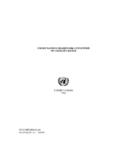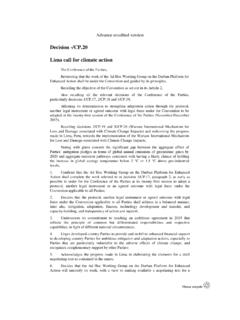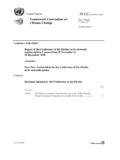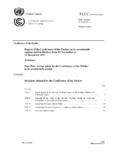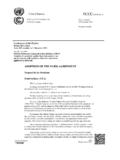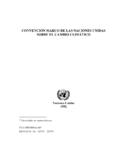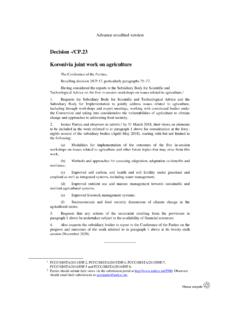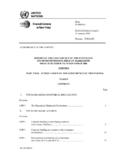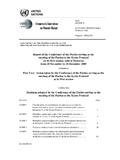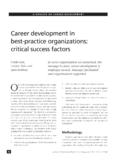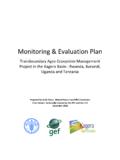Transcription of Best practices and lessons learned - UNFCCC
1 LEAST DEVELOPED. COUNTRIES. best practices and lessons learned in addressing adaptation in the least developed countries through the national adaptation programme of action process, volume 1. LDC Expert Group United Nations climate change best practices and lessons learned in addressing adaptation in the least developed countries through the national adaptation programme of action process, Volume 1. LDC Expert Group United Nations climate change Least Developed Countries United Nations climate change best practices and lessons learned Least Developed Countries TABLE OF CONTENTS. FOREWORD 5. ACKNOWLEDGEMENTS 9. ABBREVIATIONS AND ACRONYMS 9. I.
2 INTRODUCTION 10. Introduction to the LDCs under the UNFCCC 10. Impacts, vulnerability and adaptive capacity to climate change in the LDCs 14. II. THE NAPA PROCESS 17. Overall approach of the NAPAs 17. The NAPA preparation process 18. Accessing resources from the LDCF: the GEF and its agencies 19. The NAPA implementation process 22. Revision and update of NAPAs to renew relevance and improve quality 26. Scaling up to identify and address medium- and long-term adaptation 27. III. SELECTED COUNTRY EXPERIENCES WITH THE NAPA PROCESS 29. Methodology and rationale for collecting country experiences with the NAPA process 29. Bangladesh 30. Bhutan 35.
3 Burkina Faso 39. Haiti 43. Kiribati 47. Malawi 51. Sao Tome and Principe 55. Uganda 58. Summary of other issues identified in the remaining country experiences 60. IV. best practices AND lessons learned , AND IMPLICATIONS FOR. FUTURE ADAPTATION PLANNING 63. Methodology for capturing best practices and lessons learned 63. Selected best practices and lessons learned 63. Next steps: additional country case studies and work towards a best practices and lessons learned platform 70. V. ANNEXES/TABLES 71. Status of NAPA preparation and implementation, as of 13 May 2011 71. Selected publications by the LEG 75. Key LDCF documents and publications by the GEF 78.
4 United Nations climate change best practices and lessons learned Least Developed Countries 4. United Nations climate change best practices and lessons learned Least Developed Countries Foreword Executive Secretary, UNFCCC . The challenge of adapting to climate change , particularly for the least developed countries (LDCs), is an issue that has been well recognized in the UNFCCC process and in subsequent deliberations on the issue. National adaptation programmes of action (NAPAs) embody this by recognizing the urgent and immediate needs of LDCs to adapt to climate change and by providing a special window for funding. The NAPA process, and the establishment of the Least Developed Countries Fund, were steps taken to address this concern at the seventh session of the Conference of the Parties in 2001.
5 Most LDCs have now prepared their NAPAs and embarked on the implementation of the identified projects. There is clear evidence that LDC Parties, through the preparation and implementation of their NAPAs, have gained a wealth of knowledge and awareness of climate change , developed best practices and learned valuable lessons . At the sixteenth session of the Conference of the Parties in Cancun, Mexico, in December 2010, governments further recognized that adaptation must be addressed with the same priority as mitigation, and adopted the Cancun Adaptation Framework (CAF) to enhance action on adaptation. The CAF includes a process to enable LDC Parties, building upon their experience with the NAPAs, to formulate and implement national adaptation plans and an invitation to other developing country Parties to employ the modalities formulated to support those plans.
6 It is in this context that other Parties have shown increased interest in learning from the experiences of the LDC Parties in the NAPA process. In recognition of this interest, the LDC Expert Group (LEG), in consultation with LDC Parties and the Global Environment Facility (GEF) and its agencies, with support from the UNFCCC secretariat, have prepared this publication to share information on a decade of rich experiences, best practices and lessons learned in addressing adaptation in LDCs through the NAPA process. I trust that this publication will greatly contribute to advancing the discussions on adaptation in the future. Christiana Figueres, Executive Secretary United Nations Convention on climate change September 2011.
7 5. United Nations climate change best practices and lessons learned Least Developed Countries Foreword Chair, LDC Expert Group The LDC Expert Group (LEG) was established in 2001 as part of the framework to support LDCs in addressing the adverse impacts of climate change . Since that time, the LEG has provided advice to LDCs on the preparation and implementation of NAPAs. In addition, as outlined by its new mandate, received at the sixteenth session of the Conference of the Parties in Cancun, Mexico, the LEG is now also providing technical guidance and advice on: the revision and update of NAPAs; the strengthening of gender considerations and considerations regarding vulnerable populations; the integration of NAPAs into development planning; the identification and implementation of medium- and long-term adaptation and the implementation of all the elements of the LDC work programme.
8 The LEG, by the nature of its function, has had the privilege to witness not only the challenges but also the progress made by and achievements of the LDCs in addressing their urgent and immediate adaptation needs through the NAPA. process. NAPAs have increased the collective knowledge on adaptation to climate change at the national and international levels, raised awareness and provided hands-on experience in implementing concrete adaptation projects on the ground. The UNFCCC secretariat, the LEG, the GEF and its agencies and other partners and organizations have been committed throughout the NAPA process to support the LDCs in their efforts.
9 In every respect, the LDCs are pioneers in addressing issues related to adaptation to climate change . While many challenges remain, the time has come to shed light on the best practices and important lessons learned from the NAPA process. This publication provides the LEG with an initial opportunity to share these experiences with the wider international community, in the hope that they will provide insights for replicating and learning from these lessons on a larger scale. Pepetua Election Latasi, Chair of the LEG. September 2011. 6. United Nations climate change best practices and lessons learned Least Developed Countries Foreword Chair, LDC Group The Fourth United Nations Conference on the Least Developed Countries, held in Istanbul in May 2011, demonstrated that at a time when the international community continues to grapple with the impacts of multiple yet mutually reinforcing economic, and financial and food and fuel crises, the vulnerabilities of LDCs have been further accentuated.
10 In addition to these crises, climate change is one of the most complex and urgent challenges facing humanity today. Of the world's inhabitants, it is the citizens of the LDCs who are the most vulnerable, due to a combination of environmental vulnerability, inadequate resources and poverty. To the LDCs, adaptation to climate change means: addressing the urgent and immediate effects of climate change ; building the requisite capacity, measures and policies to deal with the new challenges posed by climate change that emerge every day; and climate -proofing social and economic development for today and for the future, all in a sustainable manner.
